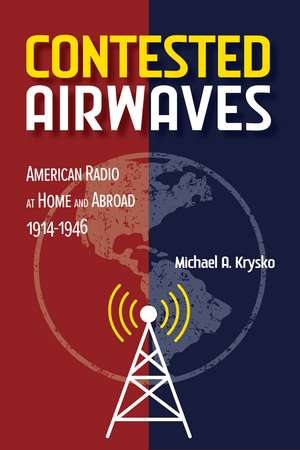Contested Airwaves: American Radio at Home and Abroad, 1914-1946: The History of Media and Communication
Autor Michael A. Kryskoen Limba Engleză Hardback – 25 feb 2025
Krysko considers Americans’ antagonism toward non-English language broadcasting; issues of identity, geography, and sovereignty that propelled opposition to Mexico’s “border blaster” stations; how a project aimed at helping Cajun-speaking listeners became a French-only celebration of Acadian culture; a failed initiative to teach English to Latin Americans via shortwave broadcasting; enduring US-Panamanian conflicts over the control of radio in and around the Panama Canal; and how farmers from across the Southwest protested a radio treaty’s perceived preferential treatment of Cuba. Paying particular attention to the act of listening, Krysko shows how these initiatives illuminated and solidified divisions rooted in identity, nationalism, and prejudice.
Clear and wide-ranging, Contested Airwaves reveals early radio’s place at the nexus of public programming, transnational relations, and its own evolution as a communication medium.
Din seria The History of Media and Communication
-
 Preț: 162.45 lei
Preț: 162.45 lei -
 Preț: 202.06 lei
Preț: 202.06 lei -
 Preț: 162.09 lei
Preț: 162.09 lei -
 Preț: 159.52 lei
Preț: 159.52 lei - 23%
 Preț: 707.25 lei
Preț: 707.25 lei -
 Preț: 173.65 lei
Preț: 173.65 lei -
 Preț: 173.05 lei
Preț: 173.05 lei -
 Preț: 190.40 lei
Preț: 190.40 lei - 23%
 Preț: 413.79 lei
Preț: 413.79 lei - 9%
 Preț: 681.81 lei
Preț: 681.81 lei -
 Preț: 234.10 lei
Preț: 234.10 lei - 9%
 Preț: 680.95 lei
Preț: 680.95 lei - 9%
 Preț: 681.81 lei
Preț: 681.81 lei - 9%
 Preț: 679.51 lei
Preț: 679.51 lei - 23%
 Preț: 402.13 lei
Preț: 402.13 lei - 8%
 Preț: 687.88 lei
Preț: 687.88 lei - 9%
 Preț: 677.21 lei
Preț: 677.21 lei -
 Preț: 213.65 lei
Preț: 213.65 lei -
 Preț: 218.81 lei
Preț: 218.81 lei -
 Preț: 252.40 lei
Preț: 252.40 lei -
 Preț: 238.28 lei
Preț: 238.28 lei -
 Preț: 225.95 lei
Preț: 225.95 lei -
 Preț: 375.62 lei
Preț: 375.62 lei - 23%
 Preț: 574.04 lei
Preț: 574.04 lei
Preț: n/a
Nou
Disponibilitate incertă
Doresc să fiu notificat când acest titlu va fi disponibil:
Se trimite...
Preluare comenzi: 021 569.72.76
Specificații
ISBN-13: 9780252046391
ISBN-10: 0252046390
Pagini: 280
Ilustrații: 14 black & white photographs
Dimensiuni: 152 x 229 mm
Greutate: 0.45 kg
Ediția:First Edition
Editura: University of Illinois Press
Colecția University of Illinois Press
Seria The History of Media and Communication
ISBN-10: 0252046390
Pagini: 280
Ilustrații: 14 black & white photographs
Dimensiuni: 152 x 229 mm
Greutate: 0.45 kg
Ediția:First Edition
Editura: University of Illinois Press
Colecția University of Illinois Press
Seria The History of Media and Communication
Notă biografică
Michael A. Krysko is an associate professor of history at Kansas State University. He is the author of American Radio in China: International Encounters with Technology and Communications, 1919-41.
Cuprins
Acknowledgments
Introduction: “The Microphone Is Mightier than the Machine Gun”—Visions of Cooperation and Realities of Conflict in Early American Radio
Part I. Imagining the Foreign Menace
Chapter 1. “Broadcasting in the Language of the Enemies of Civilization”—Foreign Language Broadcasting and American Radio, 1920–1940
Chapter 2. “An Invasion by Radio Is Crossing the Mexican Border”—John Brinkley, Border Blasters, and the Geography of American National Identity in the 1930s
Part II. Language Education and Identity on the Radio
Chapter 3. “To Help the French Speaking People of Louisiana”—Language, Education, and Identity in the French Radio Project at Louisiana State University, 1938–1940
Chapter 4. “An Efficient Way to Spread Shakespeare’s Beautiful Language”—“Basic English,” Language Education, and American International Radio, 1935–1941
Part III. Colonized Airwaves
Chapter 5. “A Workable Scheme to Quiet the Panaman Clamor”—US Radio Policy in Panama in the Shadow of the World Wars
Chapter 6. “An Almost Unbelievable Disregard of the Interests of the United States Listeners and Broadcasters”—US-Cuban Relations, American Identities, and the 1946 North American Regional Broadcasting Agreement
Conclusion: From “Whistling and Singing ‘La Paloma’” to “No Way, José”—A Century of Continuity and Change in Communications, Identity, and Borders
Notes
Bibliography
Index
Introduction: “The Microphone Is Mightier than the Machine Gun”—Visions of Cooperation and Realities of Conflict in Early American Radio
Part I. Imagining the Foreign Menace
Chapter 1. “Broadcasting in the Language of the Enemies of Civilization”—Foreign Language Broadcasting and American Radio, 1920–1940
Chapter 2. “An Invasion by Radio Is Crossing the Mexican Border”—John Brinkley, Border Blasters, and the Geography of American National Identity in the 1930s
Part II. Language Education and Identity on the Radio
Chapter 3. “To Help the French Speaking People of Louisiana”—Language, Education, and Identity in the French Radio Project at Louisiana State University, 1938–1940
Chapter 4. “An Efficient Way to Spread Shakespeare’s Beautiful Language”—“Basic English,” Language Education, and American International Radio, 1935–1941
Part III. Colonized Airwaves
Chapter 5. “A Workable Scheme to Quiet the Panaman Clamor”—US Radio Policy in Panama in the Shadow of the World Wars
Chapter 6. “An Almost Unbelievable Disregard of the Interests of the United States Listeners and Broadcasters”—US-Cuban Relations, American Identities, and the 1946 North American Regional Broadcasting Agreement
Conclusion: From “Whistling and Singing ‘La Paloma’” to “No Way, José”—A Century of Continuity and Change in Communications, Identity, and Borders
Notes
Bibliography
Index
